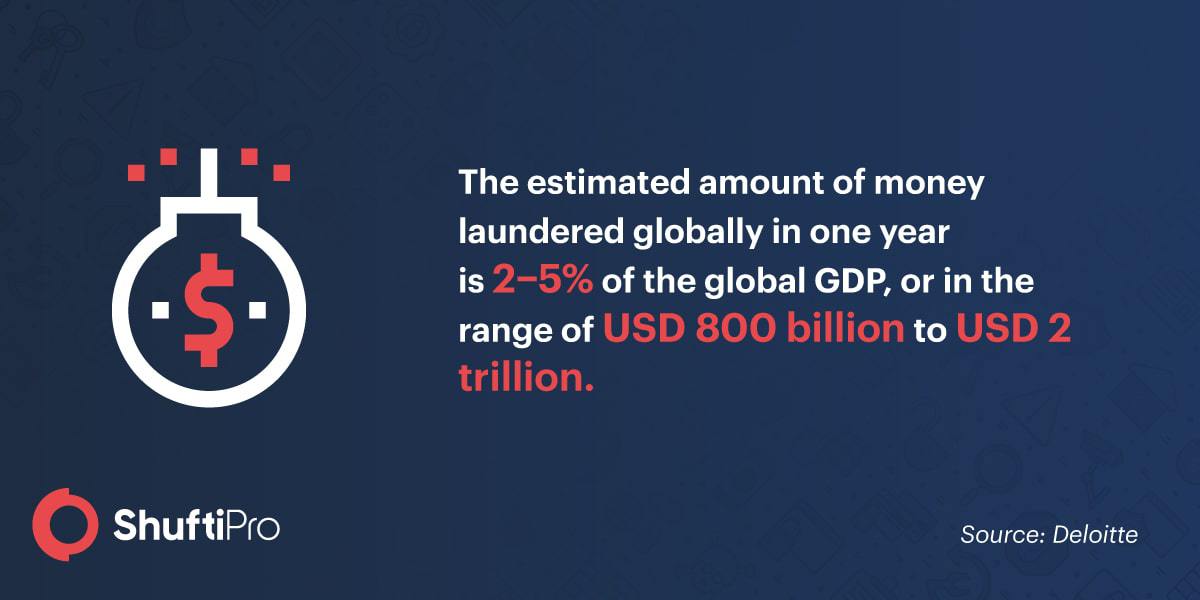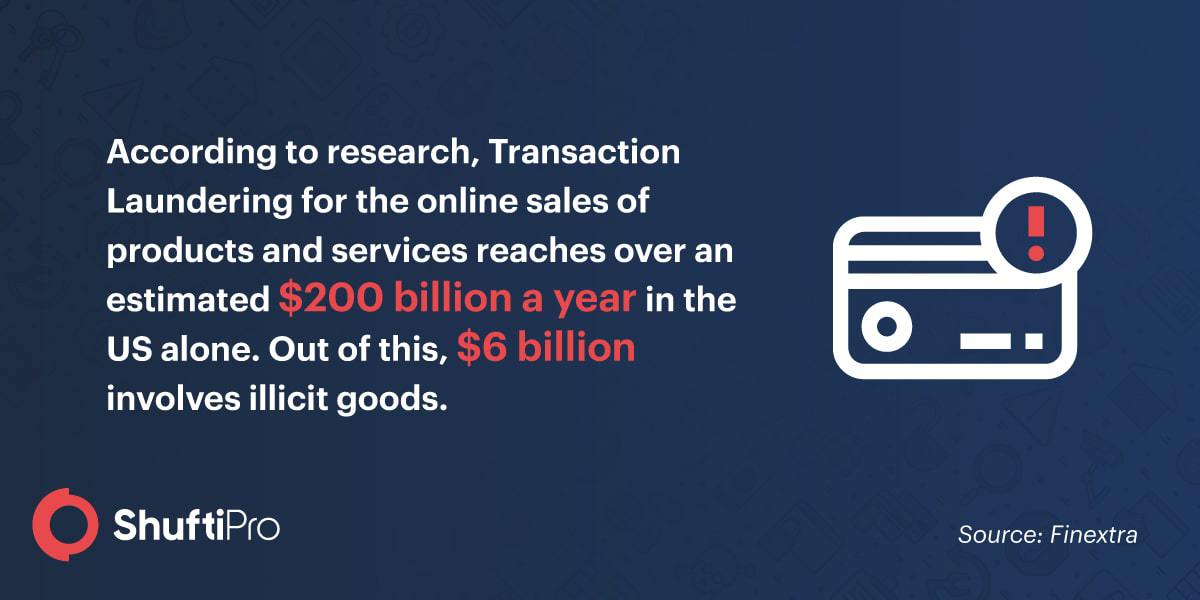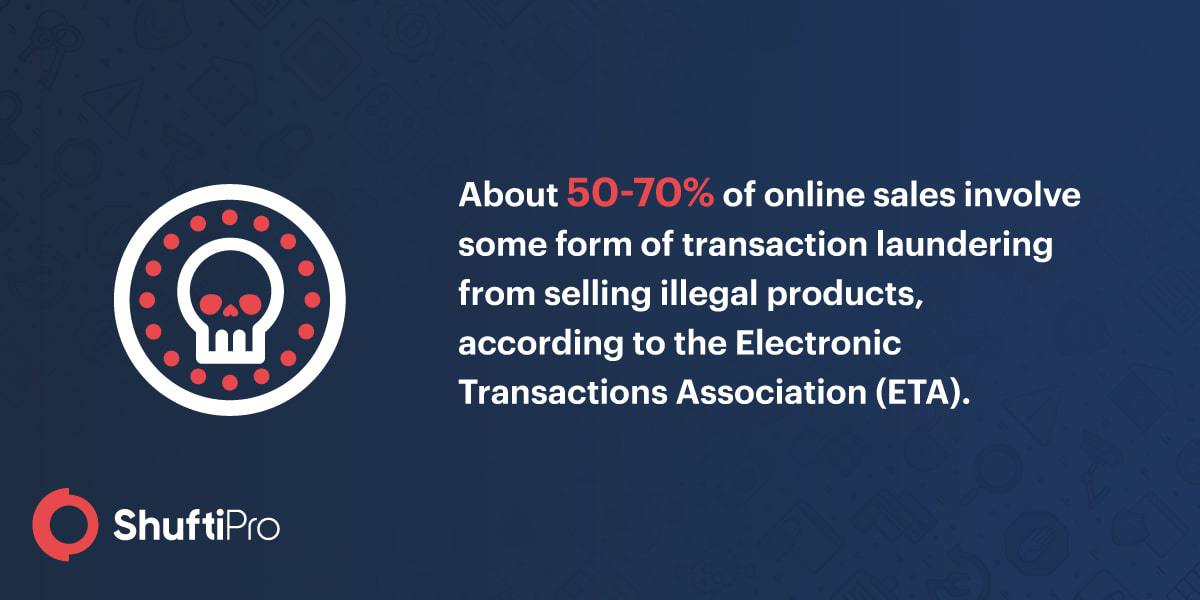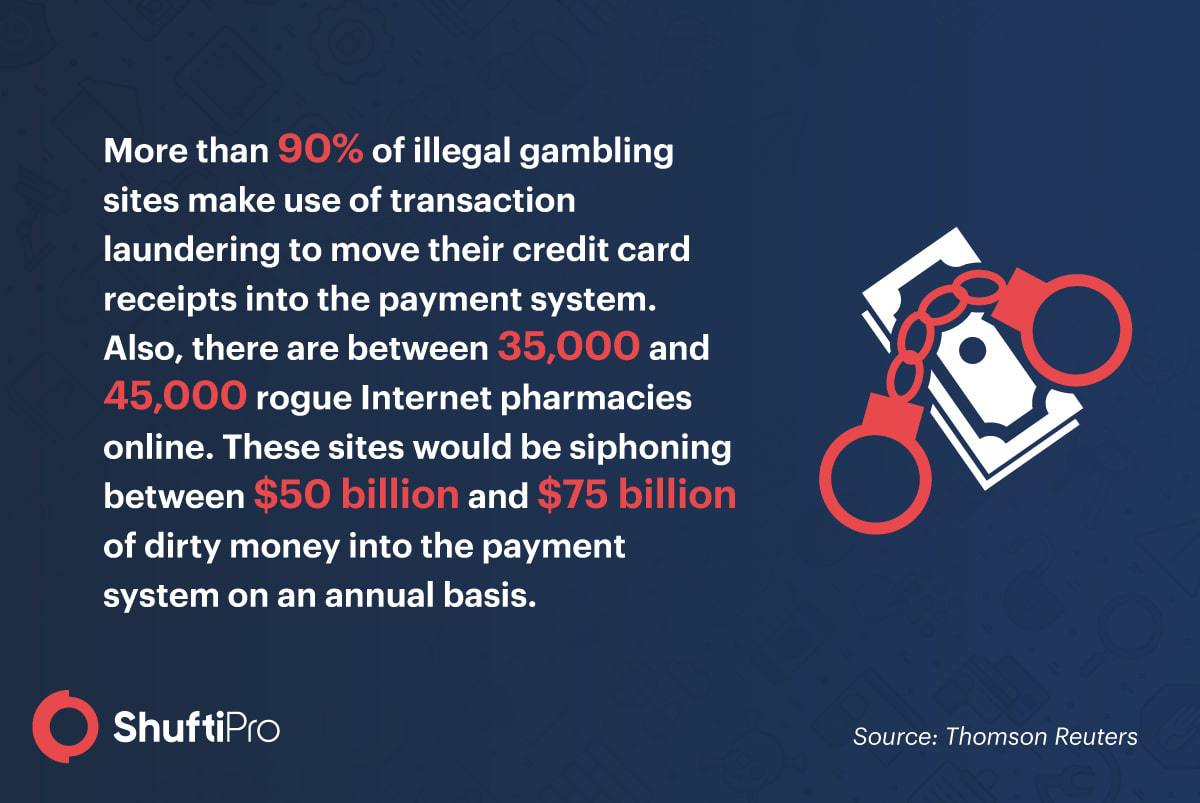Shufti’s Ongoing AML Solution to Prevent Transaction Laundering

Online financial criminals are always finding newer ways to exploit financial infrastructures in order to conceal illegal sources of their funds. After money laundering, transaction laundering is gaining the spotlight among criminals across the globe. Transaction laundering is a more refined and revolutionised form of traditional money laundering practices. Although, it may have been left unnoticed by the global regulatory authorities, until now. Transaction laundering is closely related to the e-Commerce industry. The on-going development in the e-Commerce sector has paved the way for cyber criminals mainly because it involves a large volume of personal customer data and transaction flow. Compromised customer data due to breaches lay bare the e-commerce platforms to more vulnerabilities.
Recommended: E-commerce Frauds – Common types and Prevention tips

What is Transaction laundering?
Transaction Laundering, also known as, Electronic Money Laundering, is one of the methods for disguising illicit sources of money. Illegal traffickers set up an online illegal business website, commonly known as shell websites that seem totally unrelated to the product they are selling in reality, in exchange for a safe payment gateway through banks. Customers can order illicit goods such as drugs from the site. Criminals process card payments for illegal products through another merchant’s legal payment service accounts, which as a result, helps the criminals mask their fund’s origin. The process of using another merchant’s legal payment services is referred to as transaction laundering.
Transaction laundering – Electronic form of money laundering
Transaction laundering is mostly practised to disguise the sources of the illegal drug business and almost all the illegal transactions are carried out through transaction laundering. Here vendors of illegal products develop shell websites, completely irrelevant to the product they are selling, say for example an eCommerce platform for shoes, is processing the payments from illegal goods and Merchant Service Providers (MSPs) aids laundering money by providing a safe passage for processing illegal payments. Therefore, regulatory authorities are targeting and investigating the infrastructure aiding these illegal businesses and stressing upon the need for monitoring credit card transactions to prevent transaction laundering.
Illegal traffickers involved in the drug business may reckon that financial institutions overlook online activities, thus using online options to their advantage to sell products otherwise prohibited through shell websites. Since transaction laundering is gaining attention from global regulators, the banking sector is monitoring websites with the objective of terminating them in case of illegal activities. But online criminals are finding more sophisticated ways to hide profits earned through illegal sources via online platforms. Additionally, an increasing number of eCommerce platforms are making it difficult to detect fraudulent transactions.

As crime is becoming more sophisticated, so do the Anti Money Laundering regulations to curb these crimes. Previous old manual AML regulations, that were unable to keep up with the ongoing digitisation are, too, now syncing with the digital world to prevent money launderers from exploiting digital payments.
There are an estimated 40 million e-commerce websites around the world, which are making manual due diligence and onboarding processes inefficient and nearly impossible. The reason why customer due diligence, AML, and identity verification services are using emerging technologies of Artificial Intelligence and Machine learning to meet regulatory compliance. These technologies are helping global companies, the financial sector, to be precise, in combating the crimes of transaction laundering. AI-based Identity verification solutions to meet KYC and AML compliance are a game-changer.
Recommended: Anti Money Laundering – What is AML compliance and why is it important?
How does it work?
Transaction laundering gives criminals ease to establish websites that may look legitimate but they are not. Plus, the transactions are carried through legal payment accounts which makes it extremely difficult to detect the sources. The process of transaction laundering is as follows:
- The online criminals develop illegal websites with the objective of transaction laundering by simply selling illegal products such as drugs
- Payments are processed through another merchant’s legal payment accounts to guise the illegal sources
- Merchant processes the payment and contacts the bank for receiving funds
- Funds are deposited to the criminal account, the money is, therefore, laundered.
The credit market is huge. Online customers make thousands of credit card payments every day, both in debit and credit. Over 103 billion transactions were made in the year 2015, worth $5.72 trillion in the USA alone. Therefore, investigating suspicious transactions out of these $5 trillion is near to impossible and is like finding a needle in the haystack. The problem intensifies when these illicit transactions appear as legitimate. Without robust AML and KYC solutions, there is no other way for financial institutions to determine criminal activities happening right under their noses.
Common sources of Transaction Laundering
There are 3 major sources through which transaction laundering is implemented.
- Front or shell online companies: These companies are not what they show they are. These may appear as something else but are used to sell illegal products under the veil of a legitimate business.
- Pass-through companies: These basically involve merchants with legal payment accounts that provide a passage to unlawful third parties to use their legal accounts in order to process illegal payments.
Funnel accounts: These accounts accept payments from criminals in amounts below the threshold to avoid identification, in one geographic area and are then withdrawn in another. The intermediary then uses these funds to purchase goods either through wire transfers or cheques, the illegal goods are shipped to foreign countries for selling. The profits acquired through sales are transferred back to criminal organizations.

Potential risks posed by transaction laundering
Transaction laundering poses risks to financial institutions, and some of these risks are in the form of financial losses as well as reputational damages. By letting laundered money into the payment system can violate anti-money laundering laws and regulations which can result in non-compliance fines for the banking sector, hence, financial losses. Undoubtedly, technologies are making payment processing faster, but at the same time, transaction laundering is becoming increasingly popular.
According to research, the real identities of 6-10% of online merchants remain hidden from their payment processors. Airbnb has been identified as another route for transaction laundering including Amazon, eBay, etc. Additionally, Illegal online gambling is increasingly becoming dependent on transaction laundering.
Customers, financial institutions, and society as a whole are negatively affected by the aftermath of money laundering. Financial institutions are especially vulnerable to the threat of financial crimes as key stakeholders in the company may face jail time in case of failing to meet AML compliance. Moreover, once reported, banks may lose customer trust. By ignoring money laundering activities, world economies can fail and countries with weak governments and law enforcement may give criminals easy access to institutions to commit more crime. However, every time a money laundering case becomes known the credibility of the governmental infrastructure is further weakened.

Illegal pharmaceuticals account for only one portion of the counterfeit product market accounting for $450 billion, according to ETA experts.
Monitoring transaction laundering
Transaction monitoring involves the monitoring of customer’s transaction history, information, and interactions. It includes the complete record of customer activities within financial institutions such as withdrawals, bank deposits, and transfers. Since AML compliance is mandatory for financial institutions, therefore, in order to meet the obligation, banks are using AI-powered solutions to perform on-going background checks for AML. Inherently, using automated AML solutions is one of the most effective approaches as compared to manually going through customer records for risk assessment. Also, manual processes require just the right amount of resources to prevent financial crimes. Additionally, automated AML solutions can prevent organizations from being exposed to greater levels of risk.
Recommended: The Anti-Money Laundering Solution Market is Expected to Double by 2025
Shufti’s On-going AML Solution to Prevent Transaction Laundering
Customers with high levels of risk pose great threats to the financial infrastructure. Therefore, they are required to perform a thorough risk assessment during customer onboarding processes and are checked against global sanctions, blacklists, and PEPs. On-going AML is performed to prevent high-risk customers from causing any more damage to the system, then they already have.
Shufti’s ongoing AML solution gives financial businesses a chance to perform ongoing customer monitoring. On-going AML from Shufti is powered by AI and Machine learning algorithms for conducting in-depth AML monitoring of clients to develop comprehensive risk profiles which consequently prevent the crimes of money laundering and other financial crimes such as corruption and/or terrorist financing. Financial organizations can stay one step ahead of fraudulent customers and can also meet regulatory requirements. Shufti’s ongoing AML is considered one of the best practices by global businesses to screen customers as it not only saves costs and resources but provides accurate authentications. The AML databases are updated on a regular basis to maintain client risk profiles and establish consistency with authentic background data.
Shufti’s ongoing AML solution is helping financial service providers, retailers, credit unions, insurance firms, real estate, you name it, in eliminating false positives to identify high-risk profiles through global AML screening, including:
- Identity assurance
- AML onboarding solutions
- Accurate risk profiling
- Updated risk status
- Enhanced compliance screening
- High-security standards, and
- Reduced cost of compliance
Want to know more about Shufti’s ongoing AML solution?

 Explore Now
Explore Now













